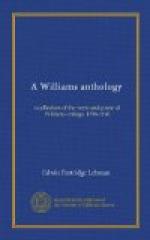“Universities,” said Professor Croisat at the centenary of the University of Montpellier in 1889, “do not come into the world with a clatter. What we know least about in all our history is the precise moment when it (Montpellier) began.” It is impossible, in many instances, to fix the date of organization of many of the foremost of the older institutions; they were not made, they grew. There was a deep necessity for their existence in the intellectual and spiritual condition of the times, and they sprang into being here and there, in Italy, France, Spain, and England, in response to that need. They were notable, at the beginning, not for academic calm, but for turbulence and vitality; for they were not universities of science, they were universities of persons. The differences of scholastic rank were not very sharply defined. In early days, whenever the university body was formally addressed by Pope or Emperor, the students were named in the same sentence as the masters.
It is unnecessary to recall here the changes in condition which have separated the student class sharply from the teaching body and divorced it almost entirely from governmental functions. What is significant for the purpose of this article is an apparent disposition in many quarters to recede from the extreme position of entire exclusion of the student body and a tendency to move in the other direction. That tendency may become very marked and lead to a very radical change of policy in the government of colleges, a change so radical as to be revolutionary in its effect. It is certain that the government of colleges, like that of states, must from time to time undergo marked modifications if it is to remain vitally representative of, and harmonious with, the growing and changing life of the college. In healthy institutional life there is free play and interaction of all the forces that go to make up the organic life, and a certain




